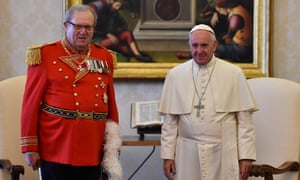 “Pope in condom row”, say the headlines.
“Pope in condom row”, say the headlines. In fact, this row has nothing much to do with condoms.
The prophylaxes in question, which might or might not have been distributed by an outreach project run under the auspices of an ancient Catholic order, are merely the trigger for a dispute that is more important even than the rights and wrongs of contraception, an issue the Catholic church has struggled badly with for over a half a century.
The real issue in the row that resulted in the sacking of the British head of the Knights of Malta is the most important question of all in the Catholic church: what is the right way to represent Christ’s teaching in the world of today?
In one corner, we have Matthew Festing, a 67-year-old former auctioneer, in his bright red, gold-tasselled suit. He represents the old-style Catholic church, the church in which rules were made at the top and adhered to by those at the bottom.
The church he loved, and would love to be part of still, was the church of the 1950s, the last hurrah of the institution that got blown away by Vatican II and the liberalism of the 1960s.
As far as he is concerned, the Catholic church is an unchanging institution whose members, once married, remain married until death and who, if they want to limit their families, must do so using only natural methods of contraception.
In the other corner we have the man who has over the last four years become the rock star of global politics: Pope Francis, an 80-year-old Jesuit in a white cassock who has emerged from the shadows to become one of the most authentic, respected and impressive world leaders of our time.
“I love your pope,” said a Muslim woman I met recently, grasping my arm to make her point. She loves him; the world loves him. It’s inside his own church that the former Jorge Bergoglio’s deadliest enemies lurk.
They are people such as Cardinal Raymond Leo Burke, an American arch-conservative who has sided with Festing over the condom row, and who has become the focal point of the hopes of those Catholics who are deeply dismayed by what they see as the impossible liberalism of Pope Francis.
Last year, Francis issued a document called Amoris Laetitia, which has left Burke and his ilk reeling: it seems to them to commit the cardinal sin of leaving it open to question as to whether a divorced and remarried Catholic can – whisper it where you will – receive communion again.
What Francis seems to be saying in his document is: let’s get real, folks. People get divorced and remarried all the time, Catholics included. Not every divorced and remarried Catholic is the devil incarnate. So, yes – he or she might very well be able to receive communion again.
Let’s leave it up to them, shall we, after a chat with their local priest or bishop?
To you and me, this is simply a small piece of ecclesiastical common sense, emanating from a tiny sovereign state where not much common sense has been forthcoming for some time. But to Burke and Festing, it’s virtual heresy.
For them, rules are rules and they simply can’t be broken. An incandescent Burke has tried to call Francis’s bluff by challenging him to define exactly what he meant by his offending woolliness in Amoris Laetitia.
Francis has intervened, and Festing
has been forced to resign. The score is 2-0, in the Argentinian’s
favour.
The
Vatican is, as every Catholic watcher knows, a hotbed of flouncing
rows, scandals and prickly situations.
But what matters here – what really matters – is that Francis has changed the Catholic church in a truly fundamental way, and he has changed it forever.
That’s what people like Festing and Burke realise, and that’s why they’re stopping at nothing to challenge him. Because what Francis has done is this: he has replaced rule-bound, traditional, unbending Catholicism with what we might call instinctive Christianity.
Francis just isn’t that bothered by the regulations; but he is very, very concerned with taking the path that he believes the man/God he follows, Jesus Christ, might have taken.
Divorce, remarriage, contraception – these aren’t the issues that keep Francis awake at night.
Trump’s presidency, the refugee crisis and the war in Syria probably are. That’s why the world loves him. And that’s why he’s so dangerous to the old order of the Catholic church.
There may well be more earthquakes to come in Italy, and not only of a geological kind.
But what matters here – what really matters – is that Francis has changed the Catholic church in a truly fundamental way, and he has changed it forever.
That’s what people like Festing and Burke realise, and that’s why they’re stopping at nothing to challenge him. Because what Francis has done is this: he has replaced rule-bound, traditional, unbending Catholicism with what we might call instinctive Christianity.
Francis just isn’t that bothered by the regulations; but he is very, very concerned with taking the path that he believes the man/God he follows, Jesus Christ, might have taken.
Divorce, remarriage, contraception – these aren’t the issues that keep Francis awake at night.
Trump’s presidency, the refugee crisis and the war in Syria probably are. That’s why the world loves him. And that’s why he’s so dangerous to the old order of the Catholic church.
There may well be more earthquakes to come in Italy, and not only of a geological kind.
